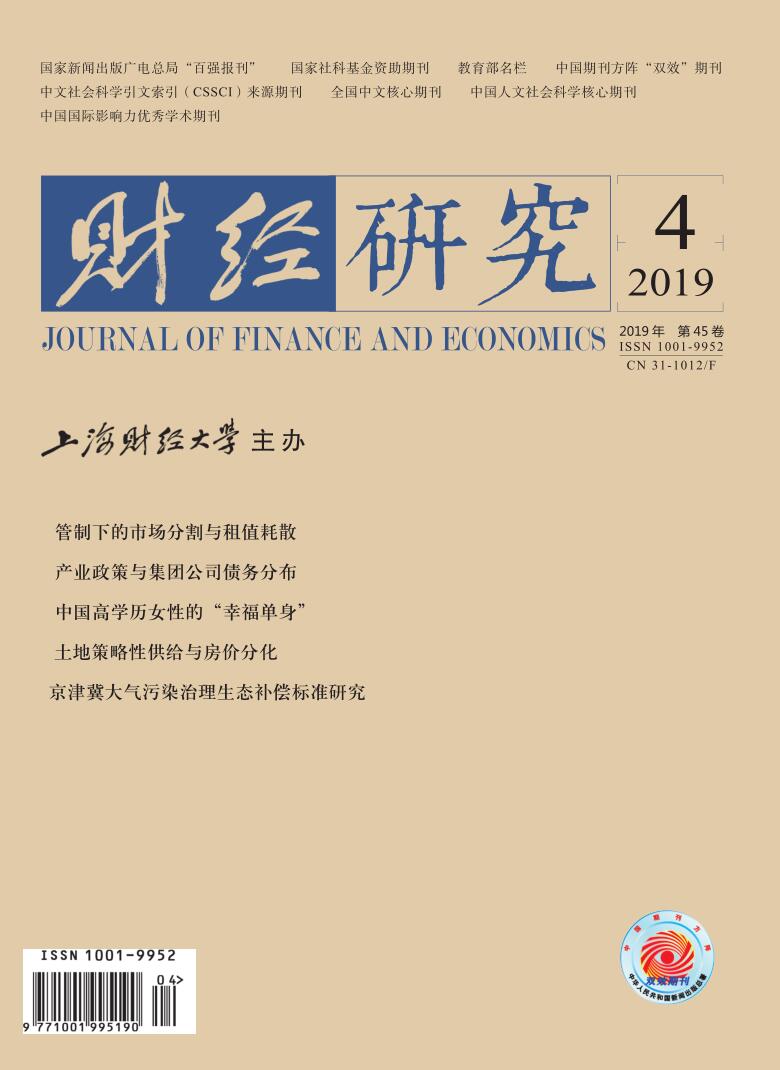近些年来,有关男女平等的话题讨论反映了女性在我国教育领域的优势。已有研究多从女性的教育投入回报较高来解释这一现象,忽视了住房在其中发挥的作用。在我国,房价的大幅上涨与女性在高校在校生中的比例上涨在时间上保持了惊人的一致。因此,从家庭住房资产的角度来分析女性教育优势,对于理解家庭教育投资决策和行为具有重要意义。文章基于中国家庭金融调查(CHFS)两期面板数据的研究发现:第一,对于只有女孩的家庭,住房价格的上涨会通过“财富效应”促进对子代的教育支出的增加;第二,“遗赠动机”的存在使得生育男孩抑制了住房对子代教育支出的“财富效应”,导致家庭住房的升值无法显著地增加子代教育支出,使得女性子代获得了更多的教育支出,进而形成了女性在教育领域的优势。
女性教育优势:基于房价上涨对子代教育支出影响的分析
摘要
参考文献
7 李旻,赵连阁,谭洪波. 农村地区家庭教育投资的影响因素分析−以河北省承德市为例[J]. 农业技术经济,2006,(5):73−78 DOI:10.3969/j.issn.1000-6370.2006.05.014
9 陆方文,刘国恩,李辉文. 子女性别与父母幸福感[J]. 经济研究,2017,(10):173−188 DOI:10.3969/j.issn.1002-5863.2017.10.060
11 余新平,熊德平. 城镇居民住房资产对家庭消费的财富效应[J]. 管理世界,2017,(6):168−169 DOI:10.3969/j.issn.1002-5502.2017.06.012
15 Becker G S. Investment in human capital:A theoretical analysis[J]. Journal of Political Economy,1962,70(5): 9−49. DOI:10.1086/258724
16 Becker G S,Tomes N. An equilibrium theory of the distribution of income and intergenerational mobility[J]. Journal of Political Economy,1979,87(6): 1153−1189. DOI:10.1086/260831
17 Becker G S,Tomes N. Human capital and the rise and fall of families[J]. Journal of Labor Economics,1986,4(3): S1−S39. DOI:10.1086/298118
18 Ben-Porath Y. The production of human capital and the life cycle of earnings[J]. Journal of Political Economy,1967,75(4): 352−365. DOI:10.1086/259291
19 Bostic R,Gabriel S,Painter G. Housing wealth,financial wealth,and consumption:New evidence from micro data[J]. Regional Science and Urban Economics,2009,39(1): 79−89. DOI:10.1016/j.regsciurbeco.2008.06.002
20 Calvo G A,Kotlikoff L J,Rodriguez C A. The incidence of a tax on pure rent:A new (?) reason for an old answer[J]. Journal of Political Economy,1979,87(4): 869−874. DOI:10.1086/260798
21 Campbell J Y,Cocco J F. How do house prices affect consumption? Evidence from micro data[J]. Journal of Monetary Economics,2007,54(3): 591−621. DOI:10.1016/j.jmoneco.2005.10.016
22 Card D. The causal effect of education on earnings[J]. Handbook of Labor Economics,1999,3: 1801−1863. DOI:10.1016/S1573-4463(99)03011-4
23 Carroll C D,Otsuka M,Slacalek J. How large is the housing wealth effect? A new approach[J]. Journal of Money,Credit and Banking,2011,43(1): 55−79. DOI:10.1111/jmcb.2011.43.issue-1
24 Fornero E, Romiti A, Rossi M. Does home ownership crowd out investment in children’s human capital? [R]. Netspar Discussion Paper No. 11, 2013.
25 Friedman M. A theory of the consumption function[M]. Princeton: Princeton University Press, 1957: 20-37.
26 Gan J. Housing wealth and consumption growth:Evidence from a large panel of households[J]. Review of Financial Studies,2010,23(6): 2229−2267. DOI:10.1093/rfs/hhp127
27 Haddad L, Hoddinott J, Alderman H. Intrahousehold resource allocation in developing countries: Models, methods, and policies[M]. Baltimore: Johns Hopkins University Press, 1997.
28 Hotz V J, Wiemers E E, Rasmussen J, et al. The role of parental wealth and income in financing children’s college attendance and its consequences[R]. NBER Working Paper No. 25144, 2018.
29 Laitner J,Ohlsson H. Bequest motives:A comparison of Sweden and the United States[J]. Journal of Public Economics,2001,79(1): 205−236. DOI:10.1016/S0047-2727(00)00101-8
30 Lefgren L,McIntyre F. The relationship between women’s education and marriage outcomes[J]. Journal of Labor Economics,2006,24(4): 787−830. DOI:10.1086/506486
31 Leth-Petersen S. Intertemporal consumption and credit constraints:Does total expenditure respond to an exogenous shock to credit?[J]. American Economic Review,2010,100(3): 1080−1103. DOI:10.1257/aer.100.3.1080
33 Mian A,Sufi A. House prices,home equity-based borrowing,and the Us household leverage crisis[J]. American Economic Review,2011,101(5): 2132−2156. DOI:10.1257/aer.101.5.2132
34 Nordblom K, Ohlsson H. Bequests, gifts, and education: Swedish evidence on parents’ transfer behavior[R]. Working Papers in Economics, nr 69, 2002.
35 Nordblom K,Ohlsson H. Bequests,gifts,and education:Links between intergenerational transfers[J]. Empirical Economics,2011,40(2): 343−358. DOI:10.1007/s00181-010-0344-0
36 Poterba J M. Stock market wealth and consumption[J]. Journal of Economic Perspectives,2000,14(2): 99−118. DOI:10.1257/jep.14.2.99
37 Schultz P T. Investments in the schooling and health of women and men:Quantities and returns[J]. The Journal of Human Resources,1993,28(4): 694−734. DOI:10.2307/146291
38 Skinner J. Housing wealth and aggregate saving[J]. Regional Science and Urban Economics,1989,19(2): 305−324. DOI:10.1016/0166-0462(89)90008-2
引用本文
耿峰, 秦雪征. 女性教育优势:基于房价上涨对子代教育支出影响的分析[J]. 财经研究, 2019, 45(4): 54-67.
导出参考文献,格式为:





 6774
6774  9321
9321

